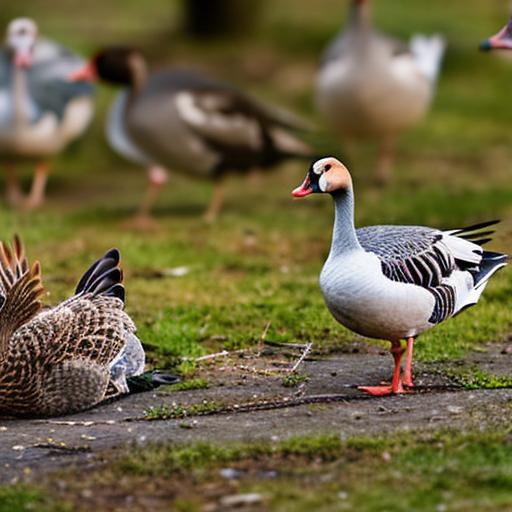Keeping geese in a residential area can be both rewarding and challenging. On one hand, geese can provide companionship, pest control, and even fresh eggs. On the other hand, they can be noisy, messy, and potentially aggressive. Before deciding to keep geese in a residential area, it is important to understand their behavior and the responsibilities that come with caring for them.
One of the benefits of keeping geese in a residential area is their ability to control pests. Geese are natural grazers and can help keep lawns and gardens free from unwanted insects and weeds. Additionally, geese can provide companionship and entertainment for their owners. They are social animals that enjoy the company of others, including humans.
However, there are also drawbacks to keeping geese in a residential area. Geese can be noisy, especially during mating season or when they feel threatened. Their honking can be disruptive to neighbors and may even violate noise ordinances in some areas. Geese are also known for their messy habits. They produce a large amount of droppings, which can be unsightly and difficult to clean up.
Key Takeaways
- Keeping geese in a residential area has both pros and cons.
- Understanding the behavior of geese is crucial in determining their suitability for residential living.
- Checking local laws and regulations is important before keeping geese in a residential area.
- Providing adequate shelter, space, and nutrition is necessary for the health and well-being of geese.
- Managing noise and disturbance, providing socialization and interaction, and training and handling are important aspects of keeping geese in a residential area.
Understanding the Behavior of Geese: Are They Suitable for Residential Living?
Before deciding to keep geese in a residential area, it is important to understand their behavior and whether they are suitable for this type of environment. Geese are social animals that thrive on companionship. They form strong bonds with their flock mates and may become stressed or lonely if kept alone. It is recommended to keep at least two geese together to provide them with the social interaction they need.
Geese are also territorial animals and may exhibit aggression towards humans or other animals that they perceive as a threat to their territory or flock. This aggression can manifest in hissing, biting, or charging behavior. It is important to handle geese with caution and to provide them with adequate space to roam and establish their territory.
In a residential area, it is crucial to provide geese with enough space and shelter. Geese need room to graze and exercise, as well as access to water for swimming and bathing. They also require shelter that protects them from the elements and predators. A secure fenced area or enclosure is necessary to keep geese safe and prevent them from wandering into neighboring properties.
Legal Considerations: Checking Local Laws and Regulations for Keeping Geese
Before keeping geese in a residential area, it is important to check local laws and regulations regarding the keeping of livestock or poultry. Some areas may have restrictions or limitations on keeping geese, such as the number of geese allowed per property or specific zoning requirements. It is also important to check if any permits or licenses are required for keeping geese.
In some areas, there may be restrictions on the type of housing or fencing that can be used for geese. It is important to comply with these regulations to ensure the safety and well-being of the geese, as well as to avoid any legal issues.
Housing Requirements: Providing Adequate Shelter and Space for Your Geese
Geese require adequate space and shelter in a residential area. They need room to roam, graze, and exercise. A general rule of thumb is to provide at least 20 square feet of space per goose. This allows them to move around comfortably and establish their territory.
In terms of shelter, geese need a secure enclosure or fenced area that protects them from predators and provides shade and protection from the elements. The enclosure should have a solid floor or bedding material that is easy to clean and maintain. It should also have access to clean water for drinking, swimming, and bathing.
Feeding and Nutrition: Meeting the Dietary Needs of Your Geese in a Residential Area
Geese have specific dietary needs that must be met in order to keep them healthy. They are herbivores and primarily eat grass, weeds, and other vegetation. It is important to provide geese with access to fresh, green pasture or a well-maintained lawn for grazing.
In addition to grazing, geese may also require supplemental feed to ensure they are receiving all the necessary nutrients. Commercially available waterfowl feed or poultry pellets can be provided to supplement their diet. It is important to avoid feeding geese inappropriate foods, such as bread or junk food, as these can lead to health problems.
Clean water is also essential for geese. They need access to fresh, clean water for drinking, swimming, and bathing. It is important to regularly clean and refill their water containers to prevent the spread of bacteria or parasites.
Health and Hygiene: Maintaining a Clean and Safe Environment for Your Geese

Maintaining a clean and safe environment is crucial for the health and well-being of geese in a residential area. Geese are susceptible to various diseases and parasites, so it is important to monitor their health and seek veterinary care when necessary.
Regular cleaning of their enclosure or fenced area is necessary to prevent the buildup of droppings and bacteria. Bedding material should be replaced regularly, and any soiled areas should be cleaned and disinfected. It is also important to provide proper ventilation in their shelter to prevent the growth of mold or bacteria.
Noise and Disturbance: How to Manage the Noise and Disturbance Caused by Geese
Geese can be noisy animals, especially during mating season or when they feel threatened. This can be a concern in a residential area where noise ordinances may be in place. To manage the noise and disturbance caused by geese, it may be necessary to provide sound barriers such as hedges or fences.
Limiting the number of geese kept in a residential area can also help reduce noise and disturbance. Keeping only a few geese instead of a large flock can minimize the impact on neighbors and the surrounding environment.
Socialization and Interaction: Providing Adequate Socialization and Interaction for Your Geese
Geese are social animals that require adequate socialization and interaction. Keeping geese in isolation can have negative effects on their well-being and behavior. It is important to spend time with geese, interact with them, and provide opportunities for socialization.
This can include activities such as hand-feeding, grooming, or simply spending time in their presence. It is important to establish trust and a positive relationship with geese through gentle handling and positive reinforcement.
Training and Handling: Teaching Your Geese Basic Commands and Handling Techniques
Training and handling geese in a residential area is important for their safety and the safety of others. Basic commands such as recall or stay can be taught to geese using positive reinforcement techniques. It is important to be patient, consistent, and gentle when training geese.
Handling techniques should also be practiced to ensure the safety of both the geese and their handlers. Geese should be handled with care, avoiding any sudden movements or actions that may startle or provoke them.
Weighing the Pros and Cons of Keeping Geese in a Residential Area
Keeping geese in a residential area can be a rewarding experience, but it also comes with its challenges. It is important to weigh the pros and cons before making a decision. Consider the benefits of pest control, companionship, and fresh eggs, as well as the drawbacks of noise, messiness, and potential aggression.
Before keeping geese in a residential area, it is crucial to understand their behavior, check local laws and regulations, provide adequate housing and space, meet their dietary needs, maintain a clean environment, manage noise and disturbance, provide socialization and interaction, and practice proper training and handling techniques.
By considering all these factors and doing thorough research, potential goose owners can make an informed decision and provide a suitable and fulfilling environment for their geese. Consulting with experts or experienced goose owners can also provide valuable insights and guidance.
If you’re considering keeping geese in a residential area, it’s important to be well-informed about their care and needs. One aspect to consider is providing proper insulation for their coop. This article on Poultry Wizard offers valuable insights on how to insulate a chicken coop, which can also be applied to geese housing. Insulating the coop helps regulate temperature and provides a comfortable environment for your geese throughout the year. To learn more about this topic, check out the article here. Additionally, if you’re concerned about keeping your geese warm during colder months, you may find the article on using a heater for a chicken coop helpful as well. You can find it here. Lastly, if you’re not ready to commit to building your own coop, you might want to explore the option of renting a chicken coop. Find out more about this alternative by clicking here.
Meet Walter, the feathered-friend fanatic of Florida! Nestled in the sunshine state, Walter struts through life with his feathered companions, clucking his way to happiness. With a coop that’s fancier than a five-star hotel, he’s the Don Juan of the chicken world. When he’s not teaching his hens to do the cha-cha, you’ll find him in a heated debate with his prized rooster, Sir Clucks-a-Lot. Walter’s poultry passion is no yolk; he’s the sunny-side-up guy you never knew you needed in your flock of friends!







